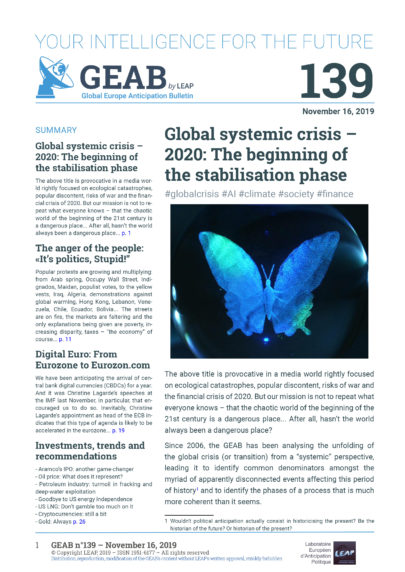GEAB 139

Popular protests are growing and multiplying: from Arab spring, Occupy Wall Street, Indignados, Maidan, populist votes, to the yellow vests, Iraq, Algeria, demonstrations against global warming, Hong Kong, Lebanon, Venezuela, Chile, Ecuador, Bolivia… The streets are on fire, the markets are faltering and the only explanations being given are poverty, increasing disparity, taxes – “the economy” of course!
Far be it from us to dismiss the economic factor in popular protest: as in any revolt, the trigger is clearly economic. But when discontent begins to look like an ever widening and deepening global trend, it is appropriate to begin to identify the revolutionary process within it.
The truth is, a revolution corresponds to a need for ‘regime’ change.
We anticipate that the revolutionary tide currently spreading around the world will only start flowing back sustainably when the first modern democratic models are put in place. However, in our opinion, the conditions are less favourable than ever for witnessing the advent of this – a process that could take another twenty years. In the meantime, we will mainly witness the ‘technologisation’ (via Big Tech, AI and the blockchain) of the control of public opinion under increasing pressure from the present financial, economic and political interests… with all the abuses, retaliations, manipulations and wars of opinion that the lack of democratic control of those tools will lead to.
Login

The above title is provocative in a media world rightly focused on ecological catastrophes, popular discontent, risks of war and the financial crisis of 2020. But our mission is not [...]
We have been anticipating the arrival of central bank digital currencies (CBDCs) for a year. And it was Christine Lagarde's speeches at the IMF last November, in particular, that encouraged [...]
Aramco's IPO: another game-changer Saudi Aramco is a wonderful illustration of the problem that we see beginning to be solved in 2020 with the establishment of a new monetary and [...]



Comments